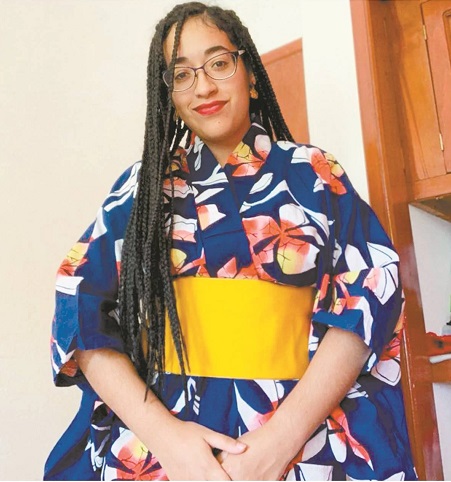That the government apologizes for the treatment and violation of that community’s rights during World War II, she claims to be of Japanese descent.
MEXICO CITY (El Universal) – During the Second World War, Mexico fought the 3 Axis, formed by Germany, Japan, and Italy. It established a special vigilance over the Japanese community in the country.
These were difficult times for the Japanese, who had to change their residence place, but under strict surveillance.
For this reason, a young woman belonging to the “nikkei” community (a Japanese word used to designate Japanese people and their descendants living outside their country) seeks an apology from Mexican authorities to that community.
Miss Jumko Ogata Aguilar is part of a Japanese family. She is in the third generation and has undertaken the search for attention from the Executive, as well as the Legislative, to expose the need for an apology to the community of which he is a part.

Miss Jumko Ogata Aguilar
“It is an apology that we ask the Mexican government, to the Japanese community that lived the violation of their human rights,” said Ogata, who studies at the College of Latin American Studies of the Faculty of Philosophy and Letters, at the National Autonomous University of Mexico (UNAM).
The young woman, whose family is based in Veracruz, has a reference that, in 1988, the former president of the United States Ronald Reagan apologized to the Japanese community for the mistreatment he received during World War II. In 2011, the president of Peru, Alan Garcia, also apologized to the Japanese in his country for the humiliation of 1941.
In a documented work that Ogata Aguilar has carried out, it is specified that Japan’s relationship with Mexico dates back to the 17th century when a group of samurai arrived in New Spain to be baptized.
The diplomatic relationship was consolidated in 1888 when Mexico became the first country to recognize Japan on equal terms. Japanese migrants settled mainly in Chiapas, Baja California, Mexico City, Sonora, Veracruz, and Coahuila.
The rejection came on December 7, 1941, when Japan attacked Pearl Harbor. “Then, the attitude towards the community changed. President Manuel Avila Camacho sought to maintain a good relationship with the United States, and restrictive measures were taken against the Japanese community, which were implemented immediately,” she explained.
Vigilance against thousands of Japanese people settled in Mexico, along with their families, increased.
On December 29, 1941, the government ordered residents of the Axis countries to report to the Immigration offices to control their movements.
Hundreds of people were forced to move to cities in the center of the country to keep them under surveillance and prevent them from “becoming spies.
“It was suffering for the Nikkei community that had to move. Many lost jobs. They could not continue working. The most affected were those who were not educated and did not speak Spanish either. Many violations of their rights were committed, even though they had nothing to do with the war. They could only move with permission from the authorities. The police watched them,” she said.
In many cases, Japanese citizens were imprisoned for no reason.
Just like in Spain
In March 2019, President Andrés Manuel López Obrador sent letters to the King of Spain, Felipe VI, and Pope Francisco, asking them to apologize for the abuses committed during the Conquest of Mexico.
“I sent a letter to the King of Spain and another to the Pope so they could tell about their grievances and ask for forgiveness from the original peoples for the violations to what is now known as human rights,” declared the Lopez Obrador.
In this regard, Jumko Ogata considered that just as AMLO requested an apology for an event during the Conquest, the Mexican government must now do the same with the Japanese community for something that happened 80 years ago.
“It is an apology to the Japanese families because they never had an acknowledgment of what was done to them. It’s not about having compensation, simply that there be a recognition that their human rights were violated,” she explained.
The young woman knocked on the door of the Ministry of Foreign Affairs (SRE), where a hearing is pending.
She also went to the Senate of the Republic, specifically to the Foreign Relations Commission, headed by Senator Héctor Vasconcelos (Morena) but has not been successful.
“I insist that [the request] is not about a government-to-government apology, but rather about the representation of power in Mexico to the Nikkei community, which has been settled in Mexican territory for years and which contributes to the development of the country,” argued the young woman.


